Focus on Drama
The Pompadour Players tell their stories
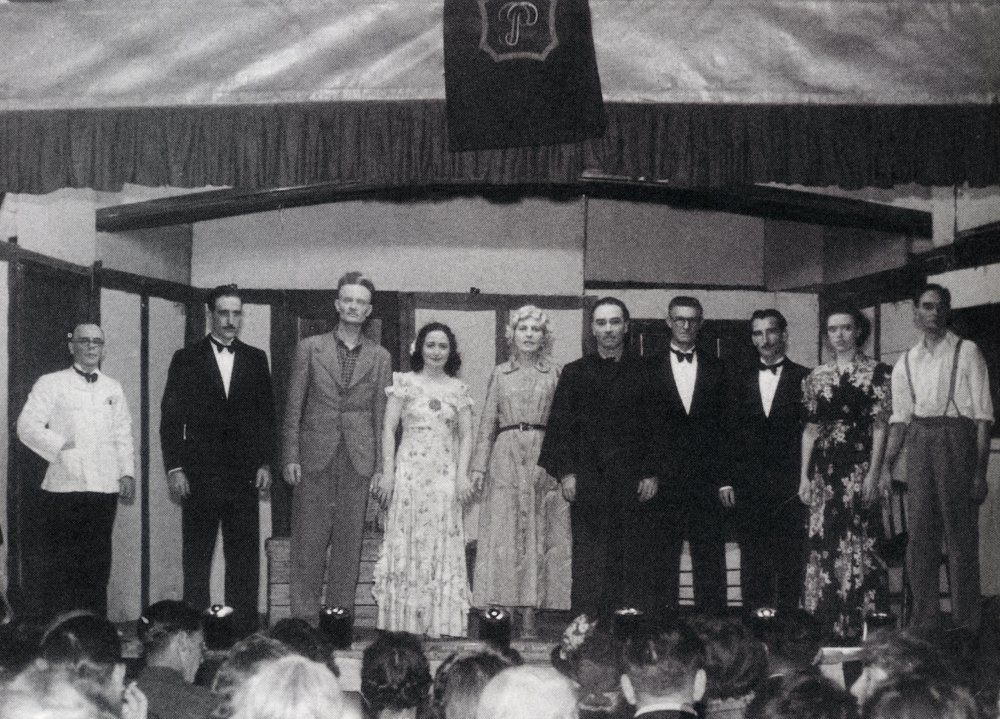
The Pompadour Players in 1951 at Whittier Hall
Amongst Dudley George’s many newspaper clippings I found some headed ‘Focus on Drama’ which I would think was a weekly feature in one of our local papers of the time. The find was of great importance to the Archive as each article was actually the cast member’s own words echoing from the early 1950’s as they talk about their lives and how they became actors and members of The Pompadour Players. I have transcribed part of the biographies below and added the cuttings to the gallery so you can read the full text if you wish.
Dudley George
The theatre has always fascinated me and yet my earliest recollections of acting are very faint I know I took part in a small play when was about 10, but the only thing that sticks in my memory is being “told off” for persistently looking out of the wrong imaginary window. My schooldays will certainly not rank among the happiest days of my life. I hated school and when drama lessons came round, my mind, as in most other lessons, was occupied with far more important things such as how to avoid going to school.
I next appeared on the stage with the local Youth Club in a Drama Festival and it was then that I realized what stage fright was. We attempted characterization by “Thornton Wilder” and in it I had to sit on a chair and go through the actions of driving a car. All went well until I lifted the front of my foot as if releasing a clutch then my nerves started playing havoc and my foot rose and fell as if beating time. Luckily no one seemed to notice and after what seemed like hours the movement gradually slowed down and stopped. That night I had a grand compliment paid to me by the adjudicator when he said that I had given “a gem of a performance.” I went home feeling very, very happy.
I did no more acting until I joined the “Pompadour Players” in the summer of 1950 and my chance came when they needed someone to take the part of “Admiral Juddy” in ‘Rookery Nook’ at short notice.
Maye George
First of all I would like to say that I am proud to be one of the “Pompadour Players.” I have always been a lover of “The Arts.” Commencing at the age of three I learnt to play a house organ and spent many happy hours and years of my life with music. When in my twenties I decided to have my voice trained and after several years was persuaded to take an exam. I came through successfully, being certified R.A.M and R.C.M. Acting was my ambition but opportunity did not come, except in a small way, and during the following years I gave quite a variety of monologues, mostly humorous.
After moving to Canvey over 21 years ago, I became associated with Mr. And Mrs. H. Thomas of Whittier Hall, giving children’s concerts and plays. I was also producer of the Women’s Institute Drama Section for two and a half years, during which time we gave benefit concerts.
It was in 1947 that opportunity offered itself. I joined the “Pompadour Players,” too late in years for the glamorous parts, but found I was in my element in character parts. Many have complimented me on my acting in the “Ghost Train.” saying, “You must have had plenty of practise.” But believe me it was purely character study, for I am repeating the words in the play, “A strict teetotaller.”
F Witcombe
My experience of amateur theatricals commenced with a village group over 20 years ago. Knowing nothing at all about it, I was unanimously elected secretary—and learned the hard way. That things invariably went “all right on the night’ was a tribute to enthusiasm rather than ability. Producing plays in a village school hall, illuminated by any gas lighting, with a playground to cross between the stage and dressing rooms was a challenge accepted, if not entirely successfully, at lease with no damping of spirits.
The difficulties of producing plays in such conditions on a small stage is epitomized in my mind in the following description written by one of the cast, after our production of “Mr. Pim Passes By “—
“Now Mr Pims next passing was on, a curious track,
He’s been and made his exit by the window at the back;
He knew he had to reappear within the library door.
So he ducked his head below the stage and crept across the floor.”
Nevertheless that production prompted one of the audience to offer to pay all the costs of altering another hall to make it suitable for play production and that became our permanent home for some years. In that little village hall a gallant attempt was made to stage an unusual choice for amateurs, “Spring on Wyn Hill” which contains a somewhat complicated lighting plot It just showed what could be achieved with a little knowledge, lots of enthusiasm, and a couple of car batteries.
About that time ill-health compelled me to retire from active participation and when I was able to return to the stage, various circumstances had forced the group to function on concert party lines to keep the financial flag flying. Versatility was the watchword—I even sang in public—but I promise not to repeat this activity at Canvey.
Kay Witcombe
May I take this opportunity of introducing myself as a newcomer to the “Pompadour Players,” but not, by any means, as & newcomer to the world of amateur theatricals. As with many of us, my first enthusiasm dates back to schooldays with the usual run of Shakespeare and Sheridan, but while still at school, I joined my first amateur dramatic society. That was some 20 odd years ago, since when I have played many and varied rotes, and have worked with societies ranging from that of a small village group (producing plays in the village hall in spite of every conceivable difficulty) and a well known London Society (with a professional producer and an impressive financial backing enabling productions to be staged at the Fortune Theatre, Drury Lane.
My experience also includes concert party work, operatic and solo-singing
Although playing at the Fortune Theatre, Drury Lane was an experience I would not have missed for worlds—the atmosphere is quite unlike that of the usual village or school hall—the small struggling group of amateurs offers more scope in that there is work for everybody. Apart from those actually playing in a production, willing hands are needed for the making of scenery, costumes, lighting effects, etc., etc., and there is plenty of fun to be had when tackling these Jobs.
Frank Daley
For a long time I wanted to join a dramatic society but I never had the pluck to do so until one day, just after the last war. I was asked by our producer, Mr Harrison, if I would be interested in becoming a member of a society he was forming. I duly became a member but I never knew how ‘green’ I was until I was asked to read a part.
Anyway to cut a long story short I was cast as the ‘Silly Ass’ in ‘The Ghost Train’. Since then I have been known only as ‘Teddy’ which was the named part in the play. I have since played in every production to date.
Henry Harrison
Much of my early childhood was spent in the theatre, both on, and backstage. Most of my memories of those days are connected with scenery, props, the smell of grease paint and powder, the excitement of “First Nights,” and last but not least, the friendliness and comradeship of theatrical folks. I suppose, in those days, I was looked upon as a sort of stage mascot, for if the show was successful, I was always rewarded by a shower of sixpences and shillings from the artistes.
Perhaps one of my earliest memories was when as a very small child I appeared in the Pantomime ‘little Red Riding Hood.” I remember being dressed in a blue velvet “Fauntelroy” suit and my act was to dance a few steps with a little girl of about my own age. The scene was a woodland glade, and everything went well until the wolf appeared. I gave a terrific unrehearsed yell, and went crying to my father standing in the wings.
Studying the technique of the “Stars” in those days, was easily the most enjoyable part of my education, and when in later years I was running a show for the troops in France and Germany, I found these early lessons extremely valuable to me.
‘Julia’
Coming from a theatrical family, it is not to be wondered at that my first interest has always been with the stage. The highlight of my school days was the rehearsals and playing of Shakespearian plays, and I must confess, it was perhaps the only subject for which I received any honours. Later, I joined a London School of Dramatic Art, and here it was, I realised that the training of an actress, can be the hardest, one that can bring most disappointments, yet one of the most fascinating and grandest jobs in the world
After the Dramatic School, I joined the “Cantabs” Dramatic Society, and took the lead in many of their plays both in London and Cambridge. Unfortunately, this came to an end when the war started in 1939 and for the war years there was a blank in my stage career. When the Pompadour Players were formed, I was asked if I could spare one or two evenings to help in their productions. That was over six years ago and those one or two evenings have lengthened into every rehearsal and every show.
Pat Ives
My first connection with the Pompadour Players” was way back m 1948. Having heard that Mr. Harrison was coming over to Canvey looking not for talent but for “types,” I turned up at the appointed meeting place hoping to be noticed. Mr. Harrison introduced himself and asked if I would join the company he was about to form as was a type he wanted. What type I have never discovered, but judging from some of the parts I have had its a somewhat acid tongued female!
By dint of hard work Mr. Harrison has moulded us all into shape. We have had great fun and many heart attacks from explosions that were too loud and nearly wrecked the place, to pistols that wouldn’t go off when they we’re supposed to.
Reg Goudge
I was born at a very early age. Surprisingly enough I was with my brother at the time. I remember it well. It was a Thursday, I know it was a Thursday as we had fish the next day.
Humour has always been foremost in my life, but my first direct connection with the stage was at the age of five, when I sang a duet with my father entitled “Little Brown Jug.” There followed many tedious hours at school where I studied everything except dramatic art.
My next appearance on the stage was in a Scout concert, once again a funny part-in pantomime I then had no more connections with the stage until I joined the Services, and also the RAF Concert Party at the camp at which I was stationed. I was privileged to have many funny parts going on tour together with 24 others visiting many camps, making many friends, and getting many laughs. I wish to state that I owe my success in life to the fact that I never smoked. I never drank and I never went out with girls until 11 ½ vears of age. After being “demobbed’ I did nothing else on the stage until I joined The Pompadours. This was a new experience to me, as I had never tackled anything so straight before-my first part being just a walk-on which I feel I over-acted. This was not funny.
Walter Martin
When somewhere about the time hostilities ended in the late war, I attended a meeting at what was then the headquarters of the Home Guard in Benfleet, for the purpose of running a play, I went with the idea, of helping in some way behind the scenes. However, as our worthy producer Henry Harrison had seen me taking part in one or two of the concerts which the Home Guard ran during the war he had very decided views. He informed me that he had a part for me all cut and dried in the proposed play. And so it was that I became an acting member of the “Pompadour Players.”
In company with other members I soon found myself doing all sorts of jobs in addition to acting. As Rupert Ives has told you in his article much time and enthusiasm is given to the making of the scenery and in those early days our scenery store was a small garage which was also occupied by a car in the yard of the “Anchor” Inn at Benfleet. The open yard was our workshop.
In many respects I was more fortunate than most of my companions in the “Pompadours” as I had already had some experience before the footlights having at one time been a member of a concert party. Perhaps it was this which also resulted in my being given the Job of stage manager in the “Pompadour” productions. Some of the lure of the footlights may have entered my veins from relatives’ who were well-known in. the entertainments world. Older members may remember Walter Howard of the Christy and Moore and Burgess Minstrels, my grandfather and Ernest Rees, my uncle who was a well-known music hall comedian.
Peggy Martin
I think I must have inherited my love of acting from my grandmother who two years ago, at the age of 80, won a first prize and a certificate for drama. All her life she had been fond of acting but while bringing up 13 children she had little time to take it seriously.
My first part was in a school play, “A Midsummer Nights Dream” I played Bottom, the weaver. Since then I have toured to pantomime, taken part in workers playtime and during the war in concerts for the troops. However not until I joined “The Pompadours”, did I realize the pleasure of working with a grand team. At the end of a performance all the tense moments that have been shared together throughout, seem to strengthen the bond between players added to the thrill of applause from an enthusiastic audience.
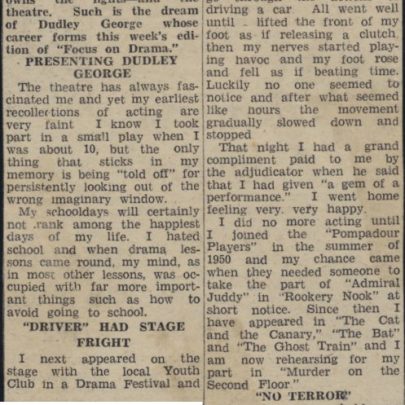
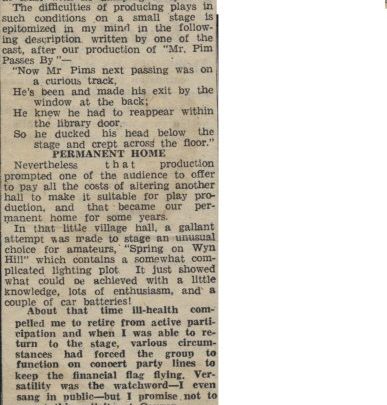
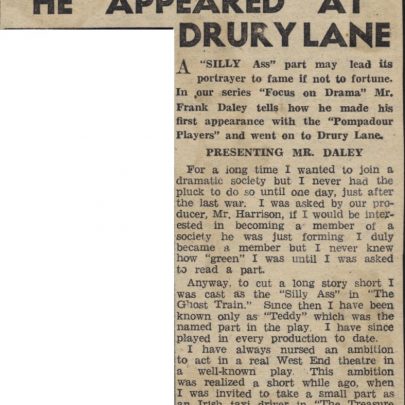
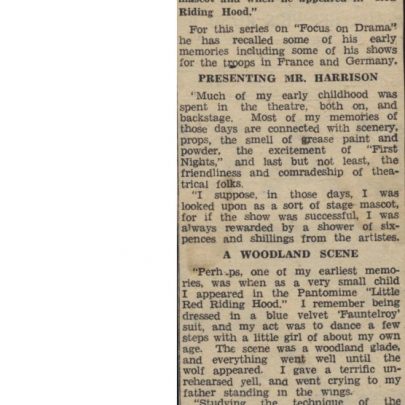
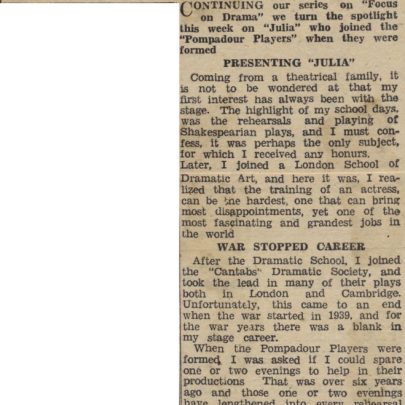
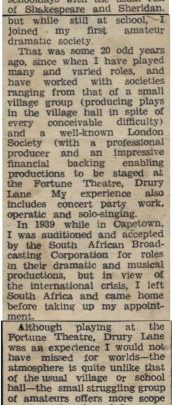
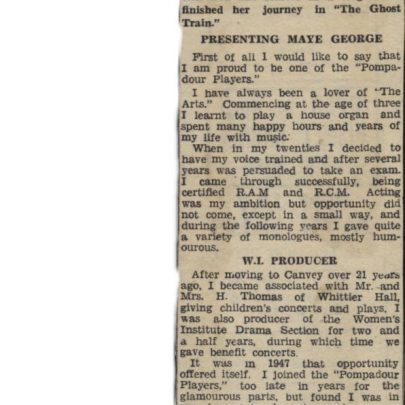
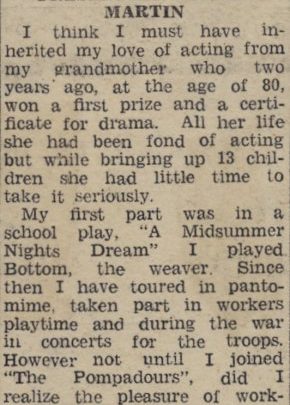
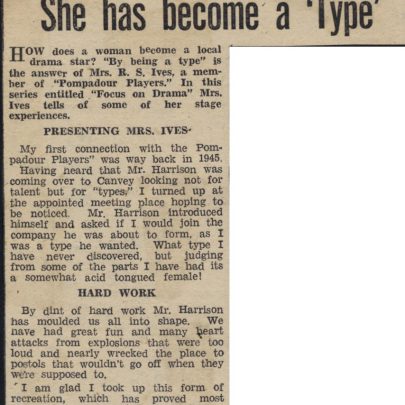
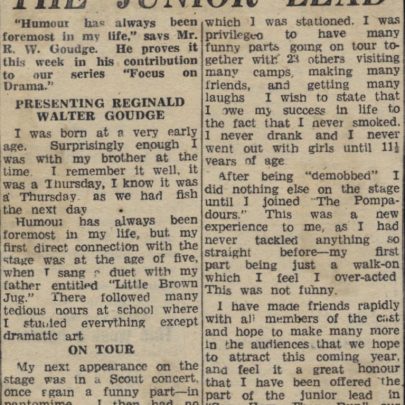
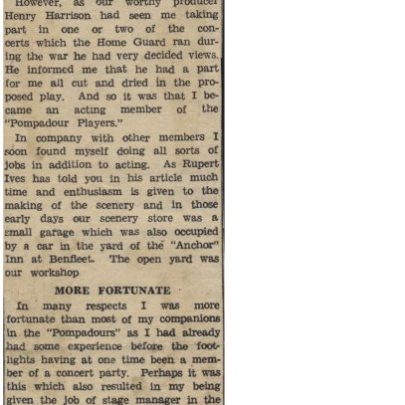




No Comments
Add a comment about this page